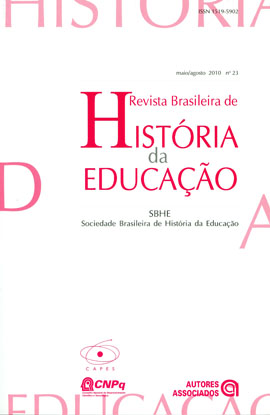<b>Povoar o <i>hinterland</i>: o ensino rural como fronteira entre estatística e educação na trajetória de Teixeira de Freitas</b>
Résumé
O presente artigo aborda a dupla ascensão de Mário Augusto Teixeira de Freitas (1890-1956) no comando das estatísticas nacionais e no debate sobre a educação durante a Era Vargas (1930-1945). O trabalho investiga a trajetória de Teixeira de Freitas, interpretando seu investimento no campo educacional como estratégia de conversão dos capitais sociais que acumulava no Ministério da Educação (campo burocrático) e no Instituto Brasileiro de Geografia e Estatística (campo científico). Analisa se a consistência e a recepção das ideias do ilustre estatístico para o ensino rural, sua principal porta de entrada nos debates pedagógicos. Pretende-se contribuir com um estudo de caso para a análise das relações mantidas entre as atividades institucionais da estatística e da educação, ao longo do período em apreço.
Téléchargements
Os direitos autorais pertencem exclusivamente aos autores. Os direitos de licenciamento utilizados pelo periódico consistem na licença Creative Commons Attribution 4.0 (CC BY 4.0): são permitidos o acompartilhamento (cópia e distribuição do material em qualqer meio ou formato) e adaptação (remix, transformação e criação de material a partir do conteúdo assim licenciado) para quaisquer fins, inclusive comerciais.
Recomenda-se a leitura desse link para maiores informações sobre o tema: fornecimento de créditos e referências de forma correta, entre outros detalhes cruciais para uso adequado do material licenciado.













